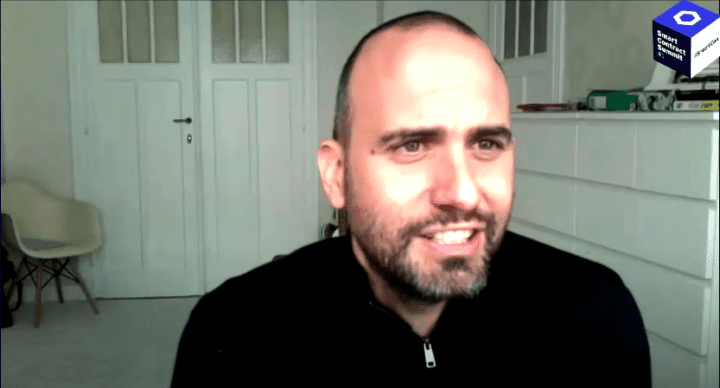In an illuminating follow-up to his talk with Swift’s Director of Capital Markets Strategy, Matthieu de Heering, at June’s Smarter Securities event, Chainlink Co-founder Sergey Nazarov joined Swift’s Strategy Director, Jonathan Ehrenfeld Solé, at SmartCon #1 for a one-on-one conversation about how the financial services industry has evolved over time and the role blockchains and hybrid smart contracts will play in its future.
Swift is the world’s leading provider of secure financial messaging services. Its public key infrastructure (PKI) and messaging standard can interact with smart contracts on different blockchains through Chainlink’s secure middleware. Nazarov and Ehrenfeld Solé illustrated how decentralized finance (DeFi) can be built on top of Swift’s existing infrastructure to create a more reliable and transparent global economic system that benefits more people, faster.
According to Ehrenfeld Solé, the path toward this future begins when traditional finance realizes that it’s stuck in the past.
“You cannot imagine the number of faxes that you continue to see in the financial industry,” he told Nazarov.
In Ehrenfeld Solé’s view, traditional asset managers, brokers and custodians working in a “hybrid mode” of digital and analogue processes aren’t truly serving their customers. “We think we know our customers, but I don’t think we do,” he said. Millennials, on the cusp of the largest generational wealth transfer in history, simply aren’t going to invest in the same products the same way their parents and grandparents did.
In order to stay relevant, traditional financial institutions will need to keep pace with growing user demand for digital assets and the ability to earn yield on those assets through DeFi. “If banks don’t change, this is going to be a hard time for them,” Ehrenfeld Solé said.
Ehrenfeld Solé and Nazarov agreed that the relationship between traditional infrastructure like Swift’s PKI and new technology like Chainlink’s decentralized metalayer is mutually beneficial.
Nazarov’s position is that utilizing the systems and standards on which the majority of the world already relies is the quickest path to mainstream blockchain and smart contract adoption. “My point of view is that existing infrastructure can absolutely and should absolutely be used,” he said.
“It’s not about just starting from scratch,” Ehrenfeld Solé agreed. “You need to build on something that already exists.” Swift’s PKI and messaging standard is used by the vast majority of the world’s banks. “The fundamental goal isn’t reinventing the user interface,” Nazarov said. Instead, the goal of blockchains and smart contracts is to innovate a new global financial system that offers everyone greater yield, transparency and control of their assets.
This doesn’t mean that banks and asset managers will necessarily become irrelevant or obsolete. “All of those market participants really just have a new market to go after,” Nazarov said. “And the ones that go after it successfully will see the benefits. That’s really just the simple way to look at it.”
Nazarov emphasized that it’s “not just a coincidence” that Swift has been a critical part of the global financial system for the past 50 years. He believes that building on top of Swift’s infrastructure will result in DeFi seeing a “massive influx of value and liquidity” into various blockchains that integrate with financial institutions through Chainlink’s interface.
“It’s really a win-win for everybody.”
Watch Sergey Nazarov’s full conversation with Jonathan Ehrenfeld Solé.
Explore other presentations from Smart Contract Summit #1’s playlist.


